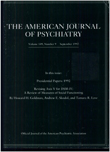Psychiatric morbidity in adult inpatients with childhood histories of sexual and physical abuse
Abstract
OBJECTIVE: To extend the knowledge on long-term effects of childhood abuse in psychiatric patients to a large sample, the authors explored childhood sexual and physical abuse in adult inpatients over 1,040 consecutive admissions. METHOD: The 947 patients were admitted to a tertiary-care military medical center. Each patient was interviewed, and abuse history, DSM-III-R diagnosis, and other characteristics were recorded. RESULTS: The prevalence of reported childhood abuse was 18% overall: 9% for sexual abuse (with or without physical abuse), 10% for physical abuse (with or without sexual abuse), and 3% for combined abuse. More female than male patients reported abuse. Alcohol use disorders were more common in victims of physical or combined abuse than in sexually abused or nonabused patients. Axis II diagnoses, particularly borderline personality disorder, were more frequent in abuse victims than in nonabused patients. Histories of drug and alcohol abuse were more common in patients reporting physical or combined abuse than in nonabused patients. Suicidality was also more frequent in abused than nonabused inpatients and was noted in 79% of the patients with histories of combined abuse. Combined abuse in women and physical abuse in men were associated with a family history of psychiatric illness, most commonly alcoholism in male relatives. CONCLUSIONS: These findings emphasize the need for greater attention to family dynamics, aggressive diagnosis and treatment of alcoholism within the family, and, especially, determination of patients' abuse histories, even if repeated questioning is necessary.
Access content
To read the fulltext, please use one of the options below to sign in or purchase access.- Personal login
- Institutional Login
- Sign in via OpenAthens
- Register for access
-
Please login/register if you wish to pair your device and check access availability.
Not a subscriber?
PsychiatryOnline subscription options offer access to the DSM-5 library, books, journals, CME, and patient resources. This all-in-one virtual library provides psychiatrists and mental health professionals with key resources for diagnosis, treatment, research, and professional development.
Need more help? PsychiatryOnline Customer Service may be reached by emailing [email protected] or by calling 800-368-5777 (in the U.S.) or 703-907-7322 (outside the U.S.).



